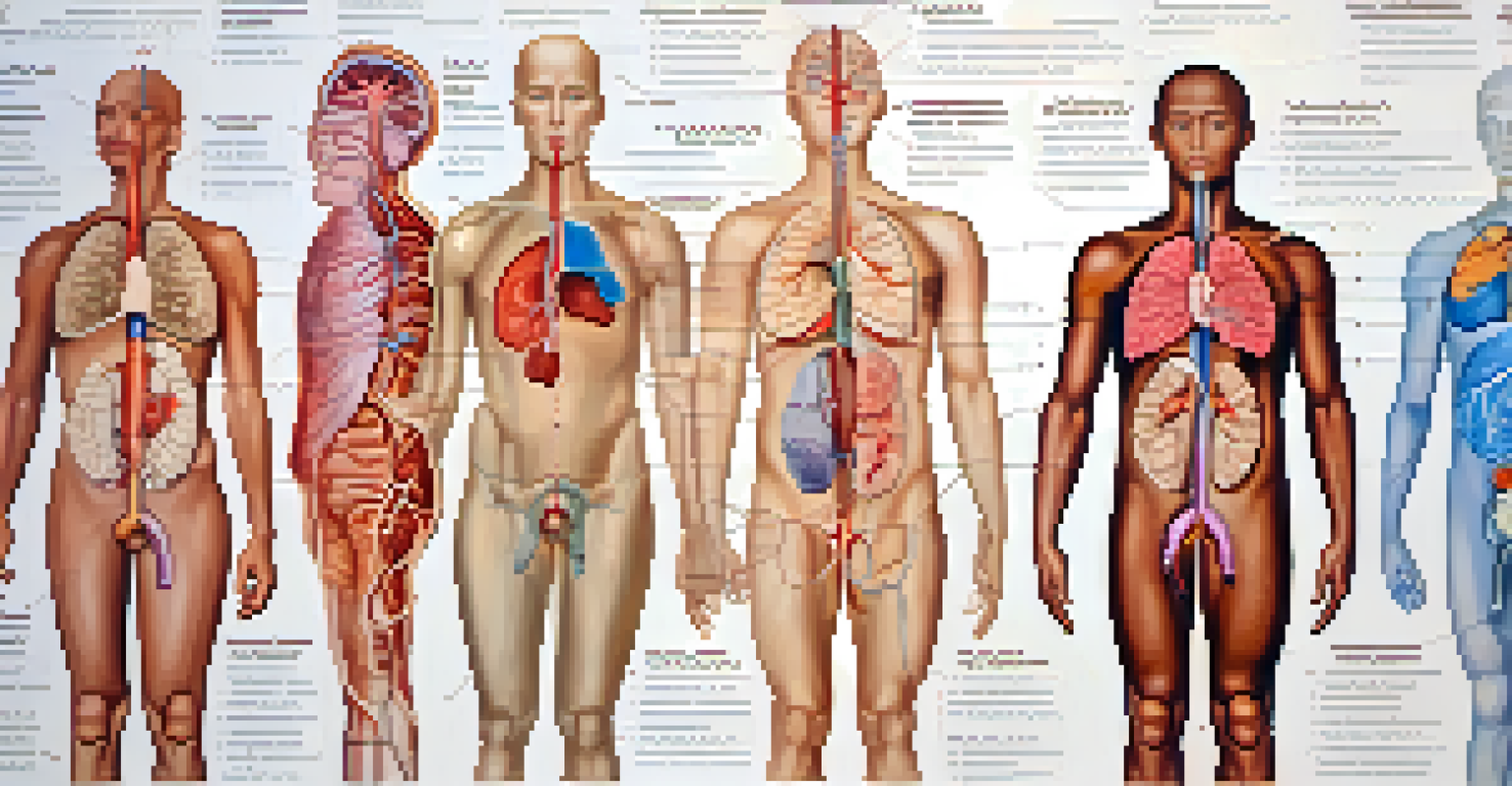Hormonal Regulation of Metabolism: A Comprehensive Guide

Understanding Metabolism and Hormones
Metabolism is the process by which our bodies convert food into energy. This complex network involves various biochemical reactions and is largely regulated by hormones. Hormones are chemical messengers released by glands in our endocrine system that influence nearly every cell in our body.
The secret of change is to focus all of your energy, not on fighting the old, but on building the new.
Think of hormones as the conductors of an orchestra, guiding the various sections to create a harmonious symphony. Each hormone plays its unique role, ensuring that metabolic processes like digestion, energy storage, and fat burning occur in a balanced manner. Without hormonal regulation, our metabolism could easily fall out of sync.
Understanding the relationship between hormones and metabolism is crucial for maintaining overall health. From weight management to energy levels, these two components work together seamlessly to keep our bodies functioning optimally.
Key Hormones Involved in Metabolism
Several key hormones play vital roles in regulating metabolism, including insulin, glucagon, cortisol, and thyroid hormones. Insulin, produced by the pancreas, helps lower blood sugar levels by promoting glucose uptake in cells. On the other hand, glucagon raises blood sugar levels, ensuring our body has enough energy during fasting.

Cortisol, often referred to as the stress hormone, can affect how we metabolize fats, proteins, and carbohydrates. Meanwhile, thyroid hormones regulate the metabolic rate, essentially determining how fast or slow our bodies burn energy. Together, these hormones create a delicate balance that is essential for metabolic health.
Hormones Regulate Metabolism
Metabolism relies on hormones like insulin and glucagon to manage energy levels and maintain balance in the body.
When these hormones function properly, our metabolism operates smoothly, allowing us to maintain a healthy weight and energy levels. However, an imbalance, whether due to stress, diet, or health conditions, can lead to metabolic disorders.
How Insulin Regulates Blood Sugar Levels
Insulin plays a critical role in managing blood sugar levels, acting like a key that unlocks cells to allow glucose in. After we eat, blood sugar levels rise, triggering the pancreas to release insulin. This process ensures that our cells have the energy they need to function effectively.
The greatest wealth is health.
In a healthy metabolic state, insulin facilitates the storage of excess glucose as glycogen in the liver and muscles. However, if insulin production is insufficient or if the body becomes resistant to its effects, blood sugar levels can spike, leading to conditions like type 2 diabetes.
Understanding insulin's role provides insight into why maintaining balanced blood sugar levels is vital for our overall health. It also highlights the importance of a balanced diet to support proper insulin function and metabolic performance.
The Role of Glucagon in Energy Regulation
Glucagon is often seen as insulin's counterpart, working to increase blood sugar levels when they drop too low. Released by the pancreas, glucagon signals the liver to convert glycogen back into glucose, releasing it into the bloodstream. This process is essential during periods of fasting or intense exercise.
Think of glucagon as a backup energy source, ensuring that our bodies have access to fuel even when food intake is limited. This hormone helps maintain energy balance and supports metabolic flexibility, enabling our bodies to switch between using glucose and stored fats for energy.
Cortisol Affects Energy Balance
Elevated cortisol levels from stress can disrupt metabolism, leading to increased cravings and potential weight gain.
An understanding of glucagon's function can inform dietary choices and exercise routines, emphasizing the need for balanced energy intake and expenditure. By keeping glucagon levels in check, we can support our metabolism and overall health.
Cortisol: The Stress Hormone's Impact on Metabolism
Cortisol, often dubbed the stress hormone, can significantly impact metabolism, particularly during periods of chronic stress. When we're under pressure, cortisol levels rise, prompting our bodies to prioritize immediate energy needs over long-term metabolic processes. This can lead to increased appetite and cravings for high-calorie foods.
While cortisol is essential for managing stress, prolonged elevated levels can result in metabolic disruptions, including weight gain and insulin resistance. It's like having an overactive alarm system that triggers unnecessary responses, creating chaos in our body's metabolic functions.
Recognizing the influence of cortisol on our metabolism underscores the importance of stress management techniques. By practicing mindfulness, exercise, and adequate rest, we can help regulate cortisol levels and support a healthier metabolic process.
Thyroid Hormones and Metabolic Rate
Thyroid hormones, primarily thyroxine (T4) and triiodothyronine (T3), are crucial for regulating the metabolic rate. These hormones dictate how quickly or slowly our bodies use energy, influencing everything from weight to energy levels. An underactive thyroid can lead to fatigue, weight gain, and sluggish metabolism.
Imagine thyroid hormones as the thermostat of your metabolism, adjusting the heat based on the body's needs. When thyroid levels are balanced, our metabolism functions optimally, allowing us to maintain a healthy weight and energy levels. Conversely, an imbalance can cause a variety of health issues.
Thyroid Hormones Control Rate
Thyroid hormones are crucial for regulating the metabolic rate, impacting energy use and overall health.
Understanding the role of thyroid hormones can empower individuals to seek appropriate medical advice if they suspect thyroid dysfunction. Regular check-ups and awareness of symptoms can lead to early detection and better management of metabolic health.
Hormonal Imbalances and Metabolic Disorders
When hormones become imbalanced, it can lead to various metabolic disorders, such as obesity, diabetes, and thyroid disease. Factors contributing to hormonal imbalances include poor diet, lack of exercise, stress, and underlying health conditions. Recognizing these factors is key to preventing and managing metabolic disorders.
For instance, insulin resistance is a common issue that can lead to type 2 diabetes, and it often stems from lifestyle choices and hormonal imbalances. By addressing these underlying causes, individuals can take steps toward restoring hormonal balance and improving their metabolic health.

Understanding the link between hormonal imbalances and metabolic disorders emphasizes the importance of a holistic approach to health. This includes maintaining a balanced diet, engaging in regular physical activity, and managing stress levels.
Supporting Hormonal Balance for Optimal Metabolism
Achieving hormonal balance is essential for optimal metabolism and overall well-being. Simple lifestyle changes can significantly impact hormone levels, such as incorporating a balanced diet rich in nutrients, engaging in regular exercise, and prioritizing sleep. These factors play crucial roles in regulating hormones like insulin, cortisol, and thyroid hormones.
Additionally, stress management techniques, such as mindfulness and yoga, can help lower cortisol levels, creating a more balanced hormonal environment. It's like nurturing a garden; when all elements are well-tended, everything flourishes.
By focusing on holistic lifestyle choices, individuals can support their hormonal health and, in turn, enhance metabolic efficiency. This proactive approach can lead to improved energy levels, weight management, and overall vitality.